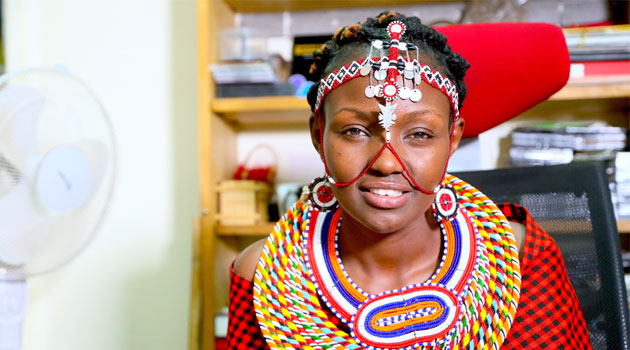
Josephine Kulea, Founder of Samburu Girls Foundation when she rescued the young girl in Samburu County/CFM
These are the moving words of Josephine Kulea, Founder of Samburu Girls Foundation when she rescued the young girl in Samburu County.
Accompanied by Kulea, Aminata* sits on a bench at a police station waiting to record a statement with the authorities.
Her eyes are completely shut as she takes a nap after a long day’s work of hawking milk to feed her husband’s family.
With a clean shaven head and her neck adorned with a stunning elaborate beaded collar, Aminata has her hands perched on the bench to support her little body as she takes a nap.
The beads that have completely covered her neck and shoulders – as beautiful as they look – signify that she is someone’s wife; at the distressing age of nine.
Aminata’s case is not unique.
Thousands of other girls suffer on a daily basis because of cultural practices of Female Genital Mutilation (FGM), beading and getting married off in their childhood.
Beading allows men aged between 15-35 years (warrior age group) to have sex as they are not supposed to marry.
Experts have called it as it should be – rape.
The girls are adorned with beads and then assigned to morans who sneak to a special manyatta built by their mothers to have sex with them.
According to Kulea, beading does not require the girl’s consent.
The girl is also not supposed to become pregnant and if she does, she has to procure an abortion in the most obnoxious manner since it is not done in a health centre.
If a girl is not being forced to undergo FGM or she is not being beaded, then she is being forced to get married to an old man in her village.
That is the culture that has inspired the likes of Kulea to dedicate their lives to face off a community where the girl child has little chance of ever becoming anything other than a wife.
Growing up as a young Samburu girl, Kulea used to walk for 42 kilometres to get to the nearest school.
“And all those 42 kilometres, we used to interact with wildlife. I was lucky to go to school because most of the girls in my community are not allowed to go to school. They believe girls are to be married off in exchange of cows as dowry. That’s the value of a girl in a pastoralist community.”
Kulea was lucky because her mother after having been forced to drop out of school to get married to her father as a fourth wife, was determined that her Kulea goes through education.
It is the same aspiration that inspires Kulea to continue saving girls in her community and surrounding counties from harmful cultural practices.
But it is a thorny journey that has earned her a title of an unpatriotic Samburu woman.
“People are just bitter, sometimes you talk about these things and they think we are talking ill of the community and our culture or they think we are becoming modernised,” she explains.
Kulea is unique.
All the times I have ran into her, whether on the streets, in meetings, her signature has always been her attire.
During the interview, she wore a colourful beaded collar and a beaded head strap and a red dress giving her an attractive look.
“My signature dressing has always been my culture. Because I am proud of the positive parts but I am not proud of the negative parts of the culture which are actually very few.”
Kulea does not only save the girls but also pursues for their justice in courts.
Surprisingly, one would have expected that only illiterate men are involved in the backward culture.
But no, even the elite are perpetrators.
Brushing the selfish wishes of insecure old men the wrong way has landed Kulea in trouble on several occasions.
Elders of her community at one time gathered to curse her to die within one hour “after they had communicated to their gods.”
“My life has always been in danger since the beginning. The first one was when old men from my village got together to curse me because I arrested my uncle. They had a big ceremony to curse me and they expected me to be dead in the next hour. But few days later, weeks later and years later I am not yet dead.”
“Even the elites… I get insulted on Facebook, I get insulted everywhere even on Twitter. They create something and say that Josephine is portraying our culture negatively. But they don’t realise these are kids in trouble and whose rights are being violated.”









































